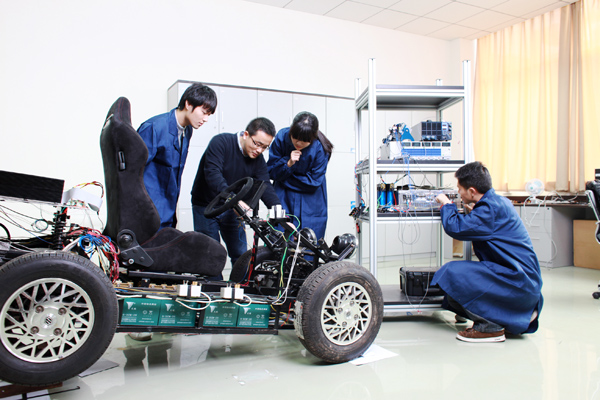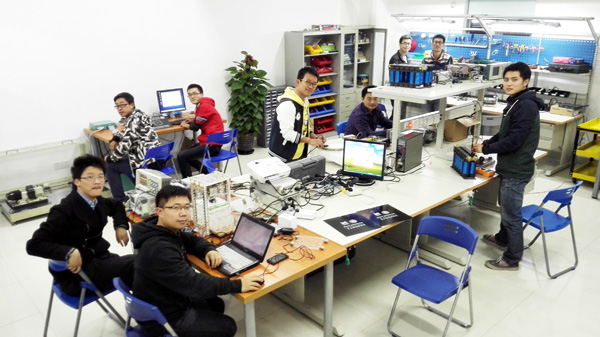“I think the uniqueness or strength of our lab is that all the members are truly connected and inspired by common research interests. Weekly meeting is an especially important place to stimulate new ideas. We are encouraged to speak out and share our own ideas. Those ideas will be openly discussed and in the most cases eventually integrated into a cross-disciplinary team work. Being benefited from this unique advantage, I was able to discover and focus on innovative research on the distributed control of multi-source energy systems and further extend to solve the optimized power distribution in novel multiple-receiver wireless power transfer systems. “
– DSC Lab member, PhD student Yin He
As a young research team from JI, Professor Chengbin Ma’s Dynamic System Control Research Laboratory (DSC Lab) came to the fore among many other well-established teams, and eventually was awarded as one of SJTU’s Leo KoGuan Top Ten research teams in 2014.
 Professor Chengbin Ma was guiding students
Professor Chengbin Ma was guiding students
As a pioneer of JI’s research laboratories, the DSC Laboratory was established in September 2010 from scratch. There were a lot of difficulties during startup. Under the joint efforts of all the members, the team has overcome many challenges in growing from 2 master students to 5 PhD students and 4 master students at present.
Prof. Ma always gives the highest priority to educating his students. With limited funding, the DSC Laboratory has done its best to support students in attending various high-level international conferences regularly every year. He believes that in order to performing cutting-edge research, it is important to provide the students with an environment that is as open as possible and where everyone is treated equally and fully motivated. As a university laboratory, his lab always focuses on the topics that are truly innovative and have strong international impacts.
 The core of Professor Chengbin Ma’s research team
The core of Professor Chengbin Ma’s research team
The DSC Laboratory started from motion control and mechanics. In recent years two new areas have been developed, the modeling and control of hybrid energy systems and the megahertz wireless power transfer. They believe that in the area of control there is a fundamental transition occurring from the control of “motion” to the control of “energy.” There will be ample opportunities in this new direction. They have proposed a novel approach to model and control networked hybrid energy systems using multi-agents and game theory. And it is particularly exciting to discover that there are many optimization and control problems in the wireless power transfer systems. Their initial results are being recognized by the international research community. In 2014 five papers from the DSC Laboratory have been accepted by major journals such as IEEE Trans. Industrial Electronics and IEEE Trans. Power Electronics. In the papers, all the first authors are the Ph.D. students. Prof. Ma’s laboratory is now active in the Energy Storage Technical Committee under the IEEE Industrial Electronics Society (IES), including maintaining the official website of the technical committee. Prof. Ma’s Ph.D. students have been awarded “Best Presentation Recognition” twice in the IECON conference, the most prestigious annual IES conference. The team will continue to work together with the international community, improve research quality, and bring impacts in the coming years.
Besides focusing on theoretical innovations, Prof. Ma’s lab has also paid attention to solve the real problems. His team has worked together with many leading companies, such as General Motors, Bosch, Intel, Nippon Chemi-con. This interaction with industry provides them precious opportunities to know the real engineering problems and in turn deepen their understanding towards theories. The close collaboration with leading companies also greatly benefits students when they start to look for future career opportunities.
Background information:
Chengbin Ma received the B.S.E.E. (Hons.) degree from East China University of Science and Technology, Shanghai, China, in 1997, and the M.S. and Ph.D. degrees both in the electrical engineering from University of Tokyo, Tokyo, Japan, in 2001 and 2004, respectively. He is currently a tenure-track assistant professor of electrical and computer engineering with the University of Michigan-Shanghai Jiao Tong University Joint Institute, Shanghai Jiao Tong University, Shanghai, China. He is also with a joint faculty appointment in School of Mechanical Engineering, Shanghai Jiao Tong University. Between 2006 and 2008, he held a post-doctoral position with the Department of Mechanical and Aeronautical Engineering, University of California Davis, California, USA. From 2004 to 2006, he was a R&D researcher with Servo Laboratory, Fanuc Limited, Yamanashi, Japan. His research interests include networked hybrid energy systems, wireless power transfer, and mechatronic control.
The focus of Prof. Ma’s Dynamic Systems Control Laboratory is to develop strategies for the control of various dynamic systems such as multi-mass system, electric vehicle, networked hybrid energy system, wireless power transfer system. Their research include a strong “mechatronics” element, i.e., synergistic integration of physical systems, control theory, sensing and actuation devices, which make possible the generation of simpler, smarter, more economical and reliable systems.
DSC Lab website: http://umji.sjtu.edu.cn/lab/dsc/





